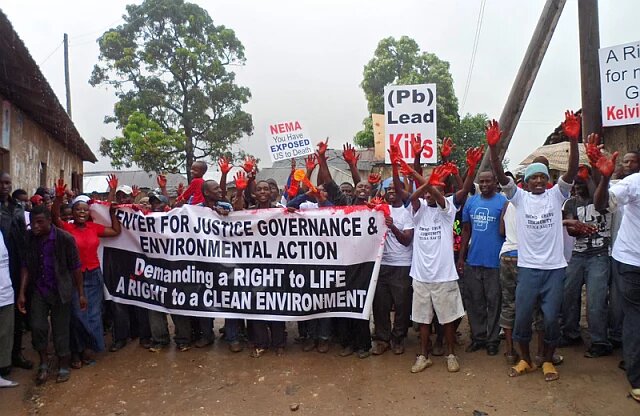On July 16, 2020 the Honorable Justice Anne Omollo delivered Judgement on petition no. 1 of 2016, the Owino Uhuru Class Action Suit, filed at the Land and Environment Court of Mombasa in 2016, seeking compensation for death, sickness and damages caused by emissions from a lead smelting factory.

The Environment Court in Mombasa has awarded Sh1.3 billion damages to 3,000 residents of Owino Uhuru slum, who filed a Class Action Suit over lead poisoning.
On July 16, 2020 the Honorable Justice Anne Omollo delivered Judgement on petition no. 1 of 2016, the Owino Uhuru Class Action Suit, filed at the Land and Environment Court of Mombasa in 2016, seeking compensation for death, sickness and damages caused by emissions from a lead smelting factory.
This ruling means the two Cabinet Secretaries for Environment and Health, Nema, EPZ Ltd- Metal Refinery factory, the Export Processing Zone Authority and Penguin Paper and Book Company as the defendants have 90 days to pay the award. The court also ordered the government to clean up Owino Uhuru slum within four months’ failure to which a further Kes 700m is to be paid. The court in its ruling found environment and health ministries, together with NEMA lacking proper regulation in handling of lead residues. This came as it was found lead from used car batteries, emitting fumes containing lead and untreated acid water were released to the environment.
The ruling comes after years of grassroots legal advocacy work spearheaded by the Center for Justice Governance and Environmental Action (CJGEA), a grassroots environmental and human rights organization, who launched a legal challenge against the government and the smelting plan owners, accusing them of violating Kenyan environmental and human rights law and exposing the community to lead poisoning.
hbs congratulates CJGEA for this breakthrough and we see it as a great achievement in environment/climate litigation. As a political foundation, we see it as an inspiration to many other like-minded organizations and communities’ groups who are at the forefront of ensuring public participation of locals in environmental governance, for environmental law enforcement and for ensuring that companies and governments are answerable to communities.
This ruling comes as a welcome win to environmental activism in Kenya after 2 past rulings in the last 2 years being in favor of the activists. In 2018 the high court sitting in Malindi ordered the Kenyan government to pay Kes 1.76b in compensation to 4,600 fisher folks in Lamu county affected by LAPSSET project, and in 2019 Kenya’s National Environment Tribunal (NET) made a landmark ruling that revoked the license granted to Amu Power Company Ltd by the National Environment Management Authority (NEMA) to construct a 1050MW coal plant in Lamu, a UNESCO World Heritage site.
For more information about this project please contact:
Tom Bicko Ooko,
Project Officer,
Center for Justice Governance & Environmental Action,
P.O. Box 97379-80112, Mombasa - Kenya.
Email:programs@centerforjgea.com
+254772967888/+254714793461
